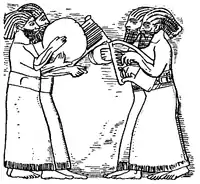Juliana Jendo | |
|---|---|
 Jendo performing at a concert, 2017 | |
| Background information | |
| Birth name | Juliana Jendo |
| Born | November 30, 1956 Tel Tamer, Syria |
| Genres | Assyrian music, Pop, Folk pop, World music, Dance, Folk dance. |
| Occupation(s) | Singer and actress |
| Instrument(s) | vocals |
| Years active | 1986–present |
Juliana Jendo (born November 30, 1956, in Tel Tamer, Syria, Syriac: ܓܘܠܝܢܐ ܓܢܕܐ) is a Syrian Assyrian singer and actress who, unlike many other Assyrian Neo-Aramaic-speaking artists, has occasionally recorded songs in Turoyo, Chaldean Neo-Aramaic and as well as in Arabic.[1] She has mostly recorded folk dance music.
Biography
Born in Tel Tamer, Syria, she studied French literature at a university there. In 1980, she and her family immigrated to the United States. She currently resides in Chicago, Illinois. Furthermore, she is on honorary chairwoman of the organization Nasraya Ad Dema that she founded.
Discography
- 1987 – Mardita
- 1988 – Khater Aynatoukh
- 1990 – Love & Dance
- 1993 – Wardeh Deesheh
- 1994 – The Flowers Of Assyria
- 1994 – Qadari (Arabic)
- 1995 – Athro Halyo (Turoyo)
- 1998 – Ashek D'Mathwathan
- 2003 – Mellatti
- 2008 – Elemo Halyo (turoyo)
- 2008 – Tel Kepeh (Arabic, Turoyo)
- 2010 – Golden Tunes
- 2015 – Talibootha
Singles
- 2021 - Go Qaploukh Babi
- 2022 - Aweleh
- 2022 - Taloukh Baby feat. Kynexx Obimba
- 2023 - Alqoshnaya
Filmography
- 1988 – Semeleh (Silent short film)
- 1991 – Wardeh Deesheh (Trampled Flowers) (Dual role: Nineveh and Nina)
- 1994 – The Flowers of Assyria (eight music videos)
- 2005 – The Cost of Happiness (Supporting role: Yimma "Mother")
References
- ↑ "Juliana Jendo". lastfm.com. lastfm. Retrieved 23 June 2015.
External links
This article is issued from Wikipedia. The text is licensed under Creative Commons - Attribution - Sharealike. Additional terms may apply for the media files.
